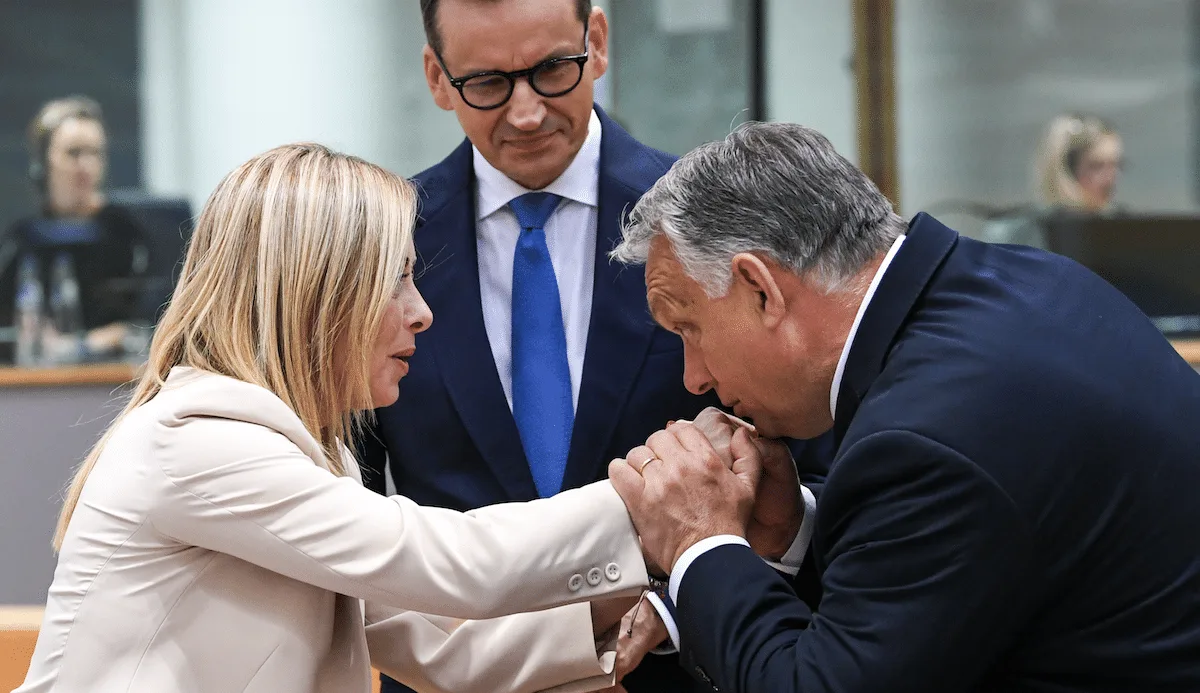Brussels – Just days before the crucial extraordinary summit of EU leaders to reach an agreement on the revision of the EU Multiannual Financial Framework (MFF) 2021-2027—with the equally crucial chapter on financial support for Ukraine—knives are being sharpened in Brussels against Viktor Orbán‘s Hungary, ready for a new filibuster in the European Council as already happened a month and a half ago. According to a document drafted by the Council Secretariat and viewed by Financial Times, a plan is being drawn up within the EU institution to hit the Hungarian economy in the event of a new Orbán veto at the Feb. 1 summit, a sort of counter-argument to force Budapest to reach a negotiated twenty-seven solution and to end Hungary’s game of “unanimity” in exchange for frozen funds.

“In the event of no agreement on Feb. 1, the other heads of state and government will publicly state that, in light of the Hungarian prime minister’s unconstructive behaviour, they cannot imagine” that EU budget funds can “be provided” to Budapest, reports the document quoted by the British newspaper. In the event of a cut in the flow of funds, “European and international financial markets and companies may be less interested in investing in Hungary,” with the risk of “rapidly triggering a further increase in the cost of financing the public deficit and a decline in the currency.” This is a very hard line from Brussels, which would thus hold hostage in particular the National Recovery and Resilience Plan (9.5 billion) and cohesion policy funds (over 22 billion), putting the EU member country’s economy in serious difficulty. The document —“a background note” drafted by the Council Secretariat “under its own responsibility”, as senior EU officials let know—describes the current state of the Hungarian economy, including “very high public deficit,” “very high inflation,” and “employment and growth largely dependent” on EU and foreign funding.
The crux of the matter concerns the understanding to be reached at Thursday’s European Council on the mid-term review of the EU budget, the only chapter left unresolved at the December 14-15 leaders’ summit, when Orbán’s opposition to the start in the accession negotiations with Ukraine was overcome only by the unfreezing 10.2 billion of EU funds by the Commission. For the past month and a half, the Hungarian premier has never shown any sign of opening up to the inclusion of the €50 billion (€17 billion in grants and €33 billion in loans) financial instrument to support Kyiv in the MMF review, unless annual reviews are included to allow Budapest to keep blackmailing the Council. That is why the other EU members were forced to consider and agree in principle on a twenty-six solution, even though the preferred one remains that of a consensus among all twenty-seven on the revision of the EU budget with all of its chapters. EU sources themselves sought to downplay the importance of the Financial Times revelations, pointing out that the document “does not reflect the status of the ongoing negotiations on the MMF between the sherpas [that is, at the technical level, ed.] and at the level of EU leaders,” since it “does not outline any specific plan” on the instrument for Ukraine or to the detriment of Hungary. However, a study of the Hungarian economy just days before a summit critical to the future of the European Union and financial support for Ukraine cannot be coincidental, nor can the strong European Commission’s distancing from possible participation in these discussions: “We are not speculating on the basis of a leak of information about discussions that have taken place between member states on the preparation of the European Council,” made clear the spokesman-chief of the EU executive, Eric Mamer. Responding to questions from the Brussels press, Mamer also reminded that the Commission can put in place instruments to regulate access to EU funds “only if the conditions laid down in the regulations are met,” such as those on the conditionality mechanism on the Rule of Law, Next Generation Eu and the reimbursement of expenses incurred under the cohesion funds (including the unfrozen but still unreimbursed 10.2 billion).
However, the blocking of EU funds is not the only danger Hungary is facing. “If Orbán blocks a new deal at the February summit, the use of Article 7 to deprive Hungary of its voting rights could become a real option,” revealed to Politico several diplomatic sources. The reference is to recourse to Article 7 of the Treaty on European Union, i.e., the mechanism that allows suspension of EU membership rights in the event of a “serious and persistent” violation of the founding principles of the Union by a member country. This would be the harshest level of measures that could be put in place (by a qualified majority in the council) in case of obstruction by the Hungarian premier, forcefully invoked also by the majority of the European Parliament at the January plenary. Getting to this sanction, however, requires unanimity in the European Council in recognising the “serious and persistent” violation by the accused member country, and for this, it is necessary to consider who might oppose it at the table of EU leaders. With the alliance with Mateusz Morawiecki‘s Poland (replaced at the head of the government by the popular Donald Tusk) gone, Orbán’s closest allies are the Italian premier, Giorgia Meloni, and the Slovak counterpart, Robert Fico. Neither prime minister would like to be faced with a choice on the activation of Article 7, since scepticism of principle—and political proximity to the strongman in Budapest—this time is counterbalanced by the issue of support for Ukraine (a cornerstone of the Meloni government) and the resources to be re-directed as part of the multi-year budget review (Slovakia is particularly interested in cohesion policy funds, Italy in the ones for migration policies). Specific national interests still leave wide open the possibility that even the toughest political weapon at Brussels’ disposal could be aimed at Budapest to prevent a new stalemate.
English version by the Translation Service of Withub








